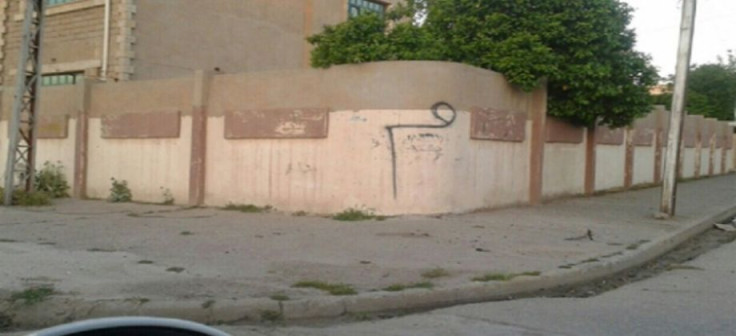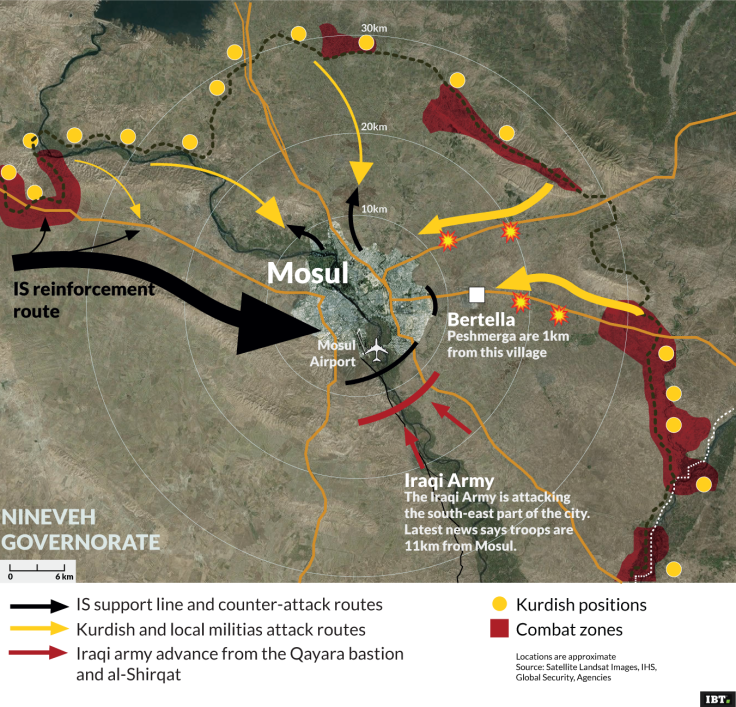Inside Mosul: Civilians hope for liberation and prepare for resistance
The Arabic 'meem' symbol spray-painted on Mosul's walls is the most visible sign of resistance to Isis rule.
A popular resistance group against the Islamic State (Isis) regime in Mosul is leaving its mark on the besieged city's walls.
The Arabic 'meem' symbol, the first letter in the word meaning resistance in Arabic 'muqawama,' has become the most visible manifestation of a rebellion in the city simmering with opposition to their terrorist oppressors.
The lives of the people living in Mosul were turned upside down when the Islamic State (Isis) overran the city, pushing out Iraqi forces in June 2014 and declaring it the crown jewel in their caliphate.
Hundreds of thousands of people fled, mostly heading towards the Kurdistan Regional Government, The towns of Duhok and Irbil, both around 80km away from Mosul, are now hosting large communities of refugees from the city.
Those who remained, an estimated 1.5 million people, have had to endured Isis' brutal rule marked by public executions, destruction of religious and historic symbols, and distorted interpretation of Islam.
The secret resistance group has been aiding the Iraqi forces advancing towards the city, risking their lives to provide crucial information on Isis (Daesh) fighters' position or conduct assassinations.
Urgent .. Mosul convulsed .. EXCLUSIVE Resistance Heros shortly before they killed local ISIS who works in husbh called...
Posted by ‎صقور الاعلام الØربي - Falcons of war media‎ on Thursday, October 20, 2016
Some of the resistance's operation are recorded and shared widely through social media accounts seeking to keep people inside and outside Mosul informed about what is going on. The messages are often written in Arabic and sometimes in English and seek to provide clear information to counter Isis propaganda.
Very .. Very Important to Mosul People, Please be careful from the deception of ISIS for the people of the city of...
Posted by ‎صقور الاعلام الØربي - Falcons of war media‎ on Friday, October 21, 2016
According to the calls received by Alghad radio, an independent station broadcasting the voices of civilians in the city, Isis is scared of the idea that people will try to resist and rise against them inside Mosul.
But an independent source who fled Mosul to Dohuk told IBTimes UK that the idea of an uprising at this stage is unlikely, as the Iraqi forces are not close enough to the city.

"It is very difficult to make an uprising in Mosul [at this stage]. As the Iraqi forces advance to Mosul, the resistance is waiting for them to rise against Isis. We ask God to help them to defeat this damn gang," the source said, speaking on condition of anonymity for fear of reprisal.
People fear that possible airstrikes on the five bridges connecting the eastern and western parts of the city would make it difficult to move from one side to the other. Civilians generally prefer to stay on the eastern side of the city (the left bank of the river Tigris), which is expected to be liberated sooner.

"Some people [who call the radio station] say they will stay in their homes no matter how dangerous" the founder of Alghad radio Mohammed Al Mawsily told IBTimes UK.
Isis has forbidden people to leave the city and anyone caught escaping risks execution. This includes the families for Daesh fighters who are trying to escape the Mosul towards Raqqa, the city under Isis control in Syria. They are moving instead to the right bank of the river, where they may find a way to cross into the neighbouring Levant country.
Whereas previous evacuations have happened predominantly via cars, people moving across the city are using motorbikes and bicycles, which are less likely to be targeted by airstrikes.
© Copyright IBTimes 2025. All rights reserved.






















